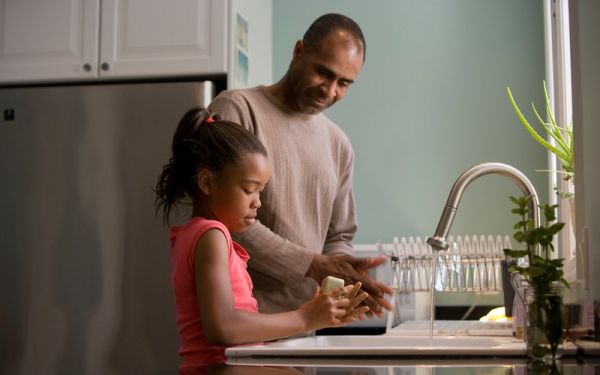
Public health messages and lifestyle learnt during COVID-19
The worldwide human cost of the COVID-19 pandemic and consequences of lockdown have been devastating to our wider community. The public message of being kind and supportive to each other during these challenging times was a key component to the community adapting so well to the changes that occurred so rapidly in the early stages. For many the lockdown has been challenging – creating and contributing to mental and financial hardship, family violence and tension – but for some the experience has been positive and there are many lessons to be learnt.
Some people took the opportunity to improve lifestyle, enjoyed the opportunity to exercise more outdoors and increase family contact time. It was wonderful to see families with their children in parks and beaches. For others, home schooling was a nightmare especially when trying to work from home!
Risk factors for COVID-19 infection
As the pandemic is progressing, scientists have identified multiple risk factors associated with COVID-19 infection. It is likely a combination of factors is involved; from the Government’s early responses to prevent its spread, early lockdown to effective public communication.
For example, prompt containment and physical distancing significantly reduced the spread through minimising contact as witnessed in many countries such as Australia and Vietnam. Higher testing rates, contact tracing, reinforcing surveillance, epidemiological monitoring, preparation for a pandemic, physical distancing, hand hygiene, wearing masks in public, access to Personal Protective Equipment, and to adequate health care are contributors that likely protected our community and kept mortality rates associated with COVD-19 down. Wearing masks are now recommended by the World Health Organisation for use in public spaces such as public transport or working in close contact with others (e.g. doctors, social workers, cashiers, etc). The Lancet recently identified masks, physical distancing and eye protection play an important role in preventing spread of viruses including COVID.
The elderly, people with co-infections, co-morbidities such as heart and lung disease, diabetes, hypertension, heart and lung disease are also high risk patients.
Lifestyle related risk factors also include obesity, being overweight and smoking. Recent research suggests smokers are more vulnerable to infection and may have a higher risk of serious illness from COVID-19 infection. Exposure to high air pollution may possibly also be a contributor to increase infection risk and mortality although more research is warranted.
Sunshine and Vitamin D
Nutritional status and Vitamin D deficiency may also be risk factors associated with COVID-19 infection. Recent research suggest nutrition and Vitamin D status may play a role warranting further research; it is encouraging there are a number of trials underway including a recent cohort study specifically related to Vitamin D and COVID-19 infection. Vitamin D is produced by the sun from UVB exposure on skin. Little is obtained from food sources. Vitamin D deficiency is prevalent in high risk groups such as naturally dark skinned people (e.g. refugees and migrants), the elderly, nursing home residents and those who conceal their skin for religious and cultural purposes. A recent meta-analysis found Vitamin D was safe and reduced the risk of Acute Respiratory Infections especially amongst those who received daily or weekly vitamin D supplements in individuals with severe deficiency (25-hydroxyvitamin D [25(OH)D] concentration of < 25 nmol). A recent population study and other studies found Vitamin D deficiency may be an independent risk factor for COVID-19 infection, severity and hospitalisation. Another study found vitamin D supplements can reduce influenza and COVID-19 related infections and death. Vitamin D supports the immune system, has anti-viral and anti-inflammatory effects. As Australia is currently in winter, there may be a need for more vitamin D supplementation in high risk groups to help support immune system and protect from influenza and COVID-19 infection.
Conclusion
The extended lockdowns now in place for Victoria will put more strain on people especially vulnerable people who live alone and the elderly. It is important to adapt to the changes of the pandemic where ever we live, and take good care of ourselves and maintain a healthy lifestyle during this time – be kind, compassionate, and courteous to each other; eat well, daily exercise especially outdoors for appropriate sun exposure, rest and early to bed for a good night sleep. Avoid exposing ourselves to negative media especially if it makes us feel more depressed and anxious. Counseling is available free of charge; speak with your doctor.
Clearly prevention of chronic diseases and positive behavioral and lifestyle changes are essential in supporting the immune system and preventing viral spread. Hand hygiene, physical distancing, wearing masks according to studies and eye glasses in public, eating well to address nutritional status, avoiding smoking, breathing clean air, addressing obesity, exercise and increasing appropriate sun exposure for Vitamin D or taking supplements in high risk individuals are major key public health messages that may help individuals improve immune system and deal with infections better, whether that may be for COVID-19, influenza or other viruses.
This article has been written for the Australasian Society of Lifestyle Medicine (ASLM) by the documented original author. The views and opinions expressed in this article are solely those of the original author and do not necessarily represent the views and opinions of the ASLM or its Board.
A/Prof Vicki Kotsirilos AM is a GP and ASLM Fellow. She is widely quoted by the Royal Australian College of General Practitioners in NewsGP in relation to COVID-19 issues, and published a paper on risk factors on COVID-19 with a focus on air pollution in MJA Insight.
- Is there a long-term future for masks in Australia?
- Face masks: What GPs and patients need to know
- ‘You can show a lot of compassion over the phone’
- Testing for vitamin D rises again – at a cost of more than $100 m
- Air pollution associated with COVID-19 deaths
- Risk of infecting others with COVID-19 key concern for healthcare workers



